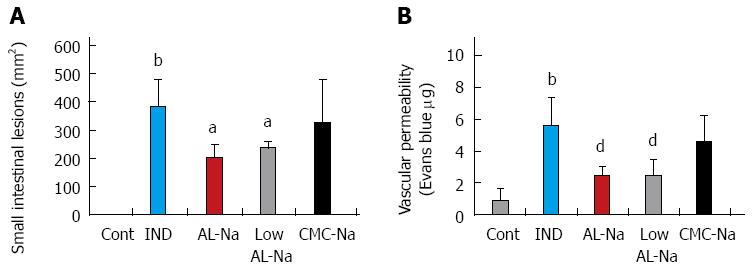Copyright
©2014 Baishideng Publishing Group Co.
World J Gastroenterol. Mar 14, 2014; 20(10): 2641-2652
Published online Mar 14, 2014. doi: 10.3748/wjg.v20.i10.2641
Published online Mar 14, 2014. doi: 10.3748/wjg.v20.i10.2641
Figure 7 Effects of low molecular sodium alginate on indomethacin-induced small intestinal lesions.
Animals were given indomethacin (10 mg/kg, po) and killed 24 h later. Original AL-Na (500 mg/kg), low AL-Na (500 mg/kg) or CMC-Na (250 mg/kg) was given orally twice at 30 min before and 6 h after administration of indomethacin. (A) The lesion areas were measured. (B) The vascular permeability was measured. Each column and vertical bar represents the mean ± SE (n = 8). Significantly different from the control group at bP < 0.01 (Student’s t-test). Significantly different from the indomethacin group at aP < 0.05 and dP < 0.01 (Dunnett’s test). Cont: Control; IND: Indomethacin; AL-Na: Sodium alginate; Low AL-Na: Low molecular sodium alginate; CMC-Na: Sodium carboxymethylcellulose.
-
Citation: Yamamoto A, Itoh T, Nasu R, Nishida R. Sodium alginate ameliorates indomethacin-induced gastrointestinal mucosal injury
via inhibiting translocation in rats. World J Gastroenterol 2014; 20(10): 2641-2652 - URL: https://www.wjgnet.com/1007-9327/full/v20/i10/2641.htm
- DOI: https://dx.doi.org/10.3748/wjg.v20.i10.2641









